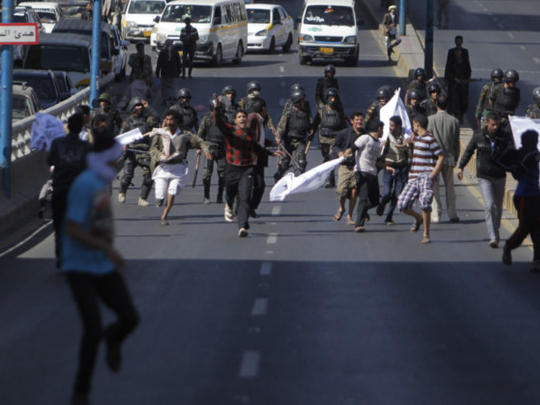
Sana’a: Yemen President Abd Rabbo Mansour Hadi said that his troubled country has managed to get out of the “danger zone” even as fighting raged between rival groups in the north.
Speaking to the envoys of the five permanent members of the UN Security Council, the GCC and EU to Yemen, Hadi has said that Yemen was moving to put an end to centralisation.
“Yemen has exited the area of danger and moved to the oasis of the national work based on modernity.”
Hadi said that he started putting into place the outcome of the National Dialogue Conference by holding a meeting with a committee that would determine the number of regions.
The conference which concluded a week ago approved a plan to divide the country into semi-autonomous regions and mandated Hadi to form a committee to decide on the number of the regions.
On the day of Hadi’s remarks, unidentified men attacked a military post in the south eastern the country, killing at least 18 soldiers and injured many others. The ministry of defence accused “criminal elements” of carrying out the attack.
Analysts say that Hadi’s remarks were to create “upbeat ambience”.
“I do not agree with the president that Yemen is really out of danger,” Abd Nasser Al Mouda’a, a political analyst, told Gulf News.
“There are many challenges threatening the existence of the state. There are attacks on oil and gas pipelines which contributed to the shrinking of the financial revenues.”
Al Mouda’a said: “The country’s current fragile state makes it difficult to turn it from centralised state into a federal one. There is an active presence of Al Qaida, Al Houthis and separatist movement in the south.”
Fierce battles
Separately, presidential and tribal mediations failed to cease the ongoing fighting between Al Houthi rebels and tribesmen affiliated with the Islamist Islah party in the north.
Clashes continued on Saturday between the two factions in Arhab district, 40km north of Sana’a, and Amran, claiming the lives of dozens of people from both sides, according to local media reports.
The Al Houthis said that the fighting sparked in the two regions when the supporters of Islah party, led Hussain Abdullah Al Ahmer, the brother of Sadeq Al Ahmer the leader of Hashid tribe, blocked two important roads leading to their stronghold Saada and displaced some of their supporters from Amran.
“The fighting is between some Zaidi tribes from Hashid and Al Ahmer militiamen,” Mohammad Abdul Sallam, Al Houthi spokesperson, told Gulf News.
Abdul Sallam put forth three demands to stop the fighting: Lifting the blockades on the roads from Sana’a to Saada and the road from Amran to Sana’a; returning pro-Al Houthi tribesmen to Houth and allowing them to freely practice their rituals and solving the issue of Aouther and Khaiwan tribes who were allegedly displaced by Al Ahmer men and allowing them to return to their homes in Amran.
“It is not true that the fighting is between us and Hashid. The Aouther and Khaiwan tribes, who are fighting Al Ahmers, are part of Hashib,” Abdul Sallam said.
Abdul Salam did not give accurate figures of the number of deaths. “We killed some of them and they killed some of our members.”
But the Islah party usually accused Al Houthis of attempting to extend their areas of influence beyond Saada. They also say that Al Houthis are trying to advance to the capital. Islah spokespersons were not available to respond to Al Houthi accusations.
The field commander of party’s fighters in Arhab, Hafid Al Hobari, told Al Sharea newspaper on Thursday that all the mediations failed when Al Houthis turned them down.
“Our demand is the departure of subversives from our villages. Al Houthis are invaders and came to shed blood, kill and terrify children, women and the elderly.”
The Ministry of interior said on Friday that two air strikes killed many Al Qaida militants and hurt others in Al Mahfed district in the southern province of Abyan on Thursday.
The ministry’s website said two pickups rushed to the scene of the strikes and carried the dead to the neighbouring province of Shabwa. The ministry said that many air strikes have recently targeted Al Qaida’s hideouts in the district.
The ministry did not say whether the US drone or Yemen warplanes carried out Tuesday’s strike.












